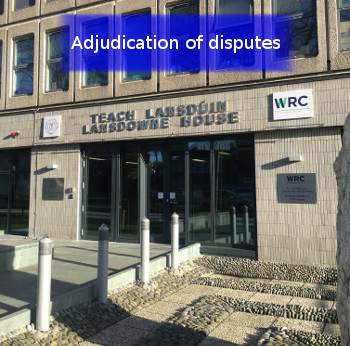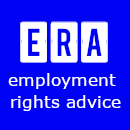The Workplace Relations Commission
How to get the best out of it
 This article looks at what the WRC is, what powers it has, bringing a claim, what happens at a hearing, the decision,bringing an appeal to the labour court, enforcing a decision,
This article looks at what the WRC is, what powers it has, bringing a claim, what happens at a hearing, the decision,bringing an appeal to the labour court, enforcing a decision,
As the saying goes “ All journeys commence with one small step”.
Before you find yourself commencing an adjudication in the Workplace Relations Commission in front of an adjudication officer, certain events must have occurred.
First of all there must be some employment law matter in dispute between an employer and an employee in Ireland.
This may have occurred when the employee was unfairly dismissed , or perhaps the payment of wages is in dispute, or the circumstances may give rise to an act of discrimination under the employment equality acts 1998 – 2004.
Whatever the details are, there must be a dispute under any of the wide range of employment laws in Ireland.
Time flies
The next step is usually the failure of the parties to achieve a resolution of the difficulty.
It is at this point that an employee finds that they have to submit a claim to the Workplace Relations Commission. This must be done within six months of the act the subject matter of the complaint. You can only submit a claim outside the six month time period in exceptional circumstances.
Rule one is therefore, get your complaint in within the time allowed. Don’t delay. You may be too late.
You are not alone
Some employees complete the claim form and submit it themselves, without seeking professional advice. Sadly in many of these cases the employee has not made a full claim, or has claimed under the wrong piece of legislation. This can result in a smaller award, or even no award at all.
You should always seek independent professional advice before submitting your claim. You will end up better financially and you get the peace of mind that comes from knowing that you are claiming for all of your entitlements. Remember two heads are better than one.
Gather the evidence. Whenever a dispute arises that challenges your employment law rights, it is important that a clear record is kept of the events. What happened? What was the time sequence ? Who said what ? Take a detailed note of what happened while it is still fresh in your memory. For more see
The strength of your case.
It is important to assess the strength of your case. What are your chances of success? That is also another reason why you should seek the advice of an experienced professional who can point out the good and bad points in your claim. You may be seeing the case only from your side. Your employer may have a different view. It is best to get a fresh set of eyes to look at the details of your claim and assess it in a professional way. You can then decide to go ahead full steam, or leave it and get on with your life. At least you will be making an informed decision.
The cost of bringing your case versus the benefit you may receive.
This follows from the strength of your case. You must consider the amount of compensation you are likely to receive. Will this be enough to justify the cost of taking the claim? The professional costs will be based on how complex the case is, how many witnesses there are, the liklihood of an appeal hearing. We will work all of this out with you so that you know what you are committing to, and there are no surprises.
The maximum amount of compensation that you can receive, varies in accordance with your claim. For example the maximum compensation in an unfair dismissal claime is two years salary. The maximum payment for a claim in respect of failure to provide a written contract is 4 weeks salary. We will discuss all of these factors with you.
Deal or no deal.
Many cases settle before reaching adjudication. Sometimes when a date for the adjudication hearing is set it can focus the mind and parties start to talk to each other seriously. It is usually at this stage that a case will settle, where settlement is possible. In other cases the parties are so far apart that agreement becomes almost impossible. It those situations adjudication is the best option.
Get ready for an adjudication
This is where the preparation of the case earlier will pay dividends. All the hard work of gathering the evidence in detail, assessing its strengths and weaknesses, remembering the details accurately means that you are prepared for the hearing. We will review all of the details with you so that we put forward our case in the best light possible.
The hearing is usually held in the WRC headquarters at Lansdown House in Dublin or in selected venues throughout Ireland. The WRC are working to expand the number of venues available outside Dublin, to facilitate users of the service.
The hearing
The adjudicator will introduce themselves and clarify the claims and deal with any preliminary points. Then each party presents their case. They may be questioned on the information they have provided. Then each party presents a summing up of their case.The hearing ends. A written decision will issue to the parties in due course.
The result
If either party disputes the decision, they can appeal the matter to the Labour Court no later than 42 days from the date of the decision.
The Labour Court
The Labour Court is an industrial relations tribunal. It is not a court of law. It can hear an appeal of an adjudicator’s decision as a fresh application. This means that all of the evidence will be presented again as a fresh hearing.
Enforcing a decision
The Workplace Relations Commision has the power to enforce decisions. However it has limited resources and the successful party can enforce the decision through the courts if necessary.
What should I do next?
Contact us without delay using the orange Yes! Tell Me More button below and we will advise you on what your best step is.
Spread the knowledge. If you found this article useful, please like and share using any of the social buttons below.






